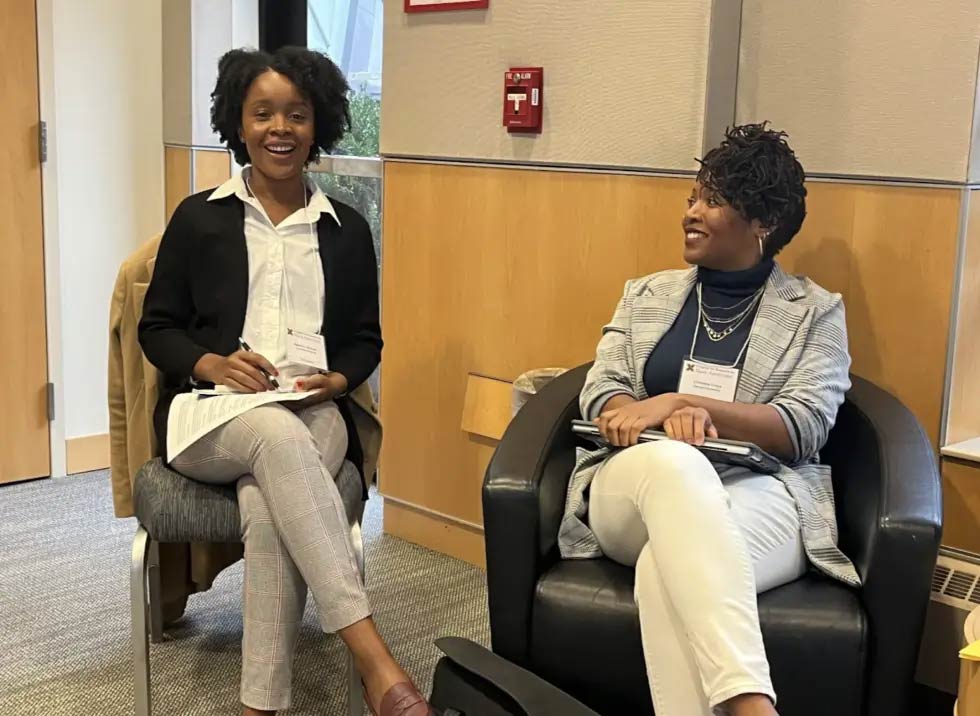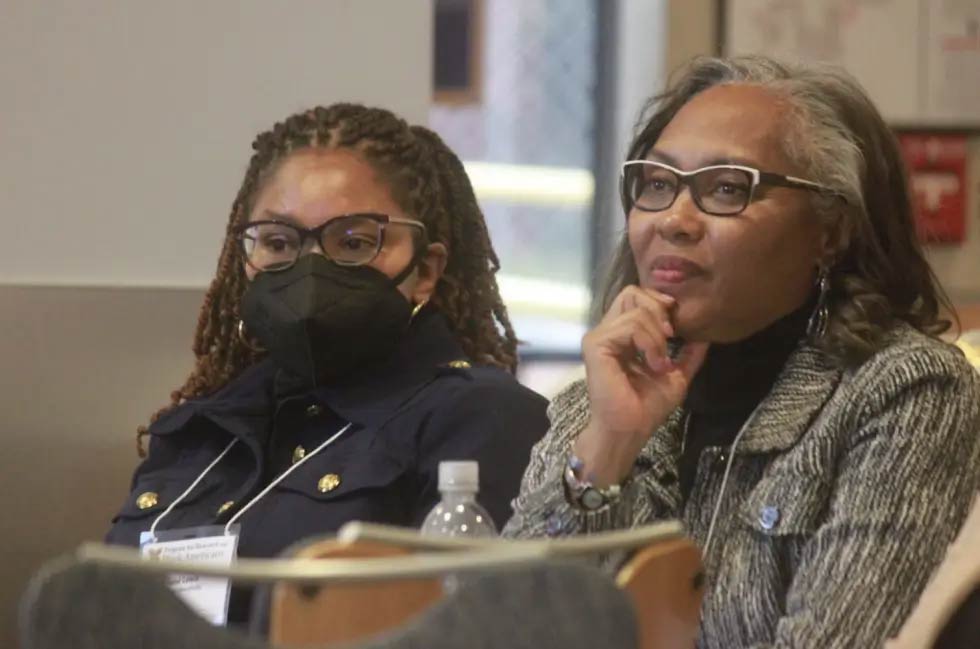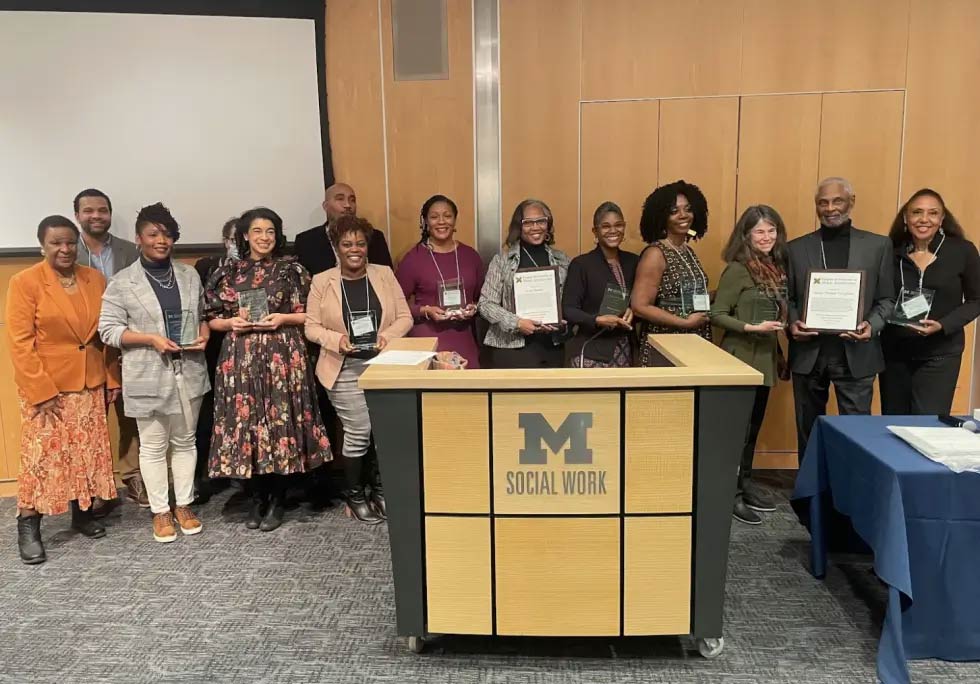Program for Research on Black Americans 2023 Reunion Unites Leading Scholars
The pioneering black psychologist James S. Jackson transformed the way that researchers study and understand Black American life– but his mentorship of a generation of Black scholars is an equally enduring legacy. The latter was the salient theme of the 2023 Reunion of the Program for Research on Black Americans, held Saturday following the James S. Jackson Symposium held by the University of Michigan Institute for Social Research (ISR).
Social scientists with past and present affiliations with both the Program for Research on Black Americans (PRBA) and the Michigan Center for Urban African American Aging Research (MCUAAAR)– many of them mentees of Jackson who have assumed leadership positions in a wide range of fields– met for a day of research discussion and connection at the University of Michigan School of Social Work.
The reunion event was hosted by PRBA Director Robert Joseph Taylor and Katrina R. Ellis, the UM professor of Social Work and Public Health, whose receipt of the James S. Jackson Emerging Scholar Award was announced the day prior.
James Jackson’s Legacy of Mentorship
“Being preceded by the James S. Jackson Celebration of Life, the PRBA reunion provided a long-awaited opportunity for the PRBA family to recognize and reflect upon the remarkable contributions and research achievements that comprise James Jackson’s and PRBA’s rich legacy,” said Taylor.
Dr. James S. Jackson founded the PRBA, the premier transdisciplinary research organization focused on the lives and well-being of Black Americans, in 1976. He was also the primary investigator of the MCUAAAR, a hub of mentorship for minority junior faculty for the past 20 years and the source of some 80 percent of PRBA’s current funding. The PRBA plays a major role supporting emerging scholars including doctoral students, postdoctoral fellows, and early-career faculty.
Alumna Karen Lincoln has likened PRBA to a historically black college within the University of Michigan. In work presented Saturday at the reunion, sociologist Bridget Goosby of the University of Texas at Austin said PRBA was mentioned frequently in interviews probing the well-being of Black American women faculty nationwide; recalling the PRBA network, one former PRBA postdoc she interviewed reported: “Michigan is our mecca.”
“This reunion has allowed us the opportunity to recommit to James Jackson’s beliefs regarding the importance of mentoring others,” said Linda Chatters of the University of Michigan School of Public Health and a member of PRBA’s faculty.

Natasha Johnson of Columbia University and Christina Cross of Harvard University at the PRBA 2023 Reunion
Gold-Standard Research on Black Americans
Opportunities for collaboration provided through PRBA have generated some of the most cited social scientific research in the world– including work from Linda M. Chatters, Harold Neighbors, Vickie Mays, Robert Sellers, Robert Joseph Taylor, David R. Williams, Lisa Barnes, and Karen Lincoln.
Speakers at the reunion event included Mosi Ifatunji of the University of Wisconsin at Madison who was the inaugural James S. Jackson Emerging Scholar; Ruby Mendenhall of the Carle Illinois College of Medicine, and Myles Durkee of the University of Michigan Department of Psychology– speaking on skin color and cardiometabolic disease, the health and wellness of youth living in neighborhoods with high levels of violence on the South side of Chicago, and racial code-switching, respectively.
R. Khari Brown of Wayne State University spoke on the contribution of PRBA’s data on Black politics starting with the National Black Election Study Series, from which key theoretical contributions emerged. For example, that data showed that Black racial consciousness has been a strong and consistent predictor of partisanship, activism, and race-based policy attitudes, and that the Black church reinforces black consciousness and political activism.
Looking forward to 2026, PRBA Research Investigator Deborah Robinson planted the seed of her vision to commemorate the 50th anniversary of PRBA, which will coincide with the US semiquincentennial. The envisioned “250 Years Project” would bring Black American scholars in PRBA’s network together with community-based organizations, churches, libraries, museums, and others in 10 cities to reflect on the meaning of the 250th anniversary of independence.

Tené Lewis of Emory and Lisa Barnes of the Rush Alzheimer’s Disease Center
PRBA Awards
A round of awards was presented at the event. Lifetime achievement awards went to Lisa Barnes; Cleopatra Caldwell; Patricia Gurin; Waldo Johnson; Jacqueline Mattis; Vickie M. Mays; Harold “Woody” Neighbors, and David Williams. Mid-Career Scholar and Career Achievement awards went to Courney Cogburn, Christy Erving, Bridget J. Goosby, Ruby Mendenhall, Krim Lacey, and Dawne Mouzon. Jamie Abelson, Jane Rafferty, and Deborah Robinson received Staff Career Awards, and Early Career Excellence in Research Awards went to Ryon Cobb, Christina Cross, Myles Durkee, and Meredith Hope.
“Receiving this recognition from PRBA has been one of the single greatest moments of my career because it provides validation that the work we’re doing to understand the lived experiences of Black America truly matters and has been vetted by the nation’s most prominent Black scholars,” said Durkee. “Also, receiving this honor from such distinguished PRBA scholars who have conducted groundbreaking research on Black Americans is especially uplifting and provides me with the drive to continue in their legacy.”

Pictured, from the left: Cleopatra Caldwell, Myles Durkee, Christina Cross, Jane Rafferty, Meredith Hope, Krim Lacey, Christy Erving, Dawne Mouzon, Lisa Barnes, Bridget Goosby, Ruby Mendenhal, Jamie Abelson, Harold “Woody” Neighbors,” and Deborah Robinson.
The PRBA is housed within the Research Center for Group Dynamics (RCGD) at the Institute for Social Research (ISR); Mosi Ifatunji, R. Khari Brown, Linda Chatters, Harold “Woody” Neighbors, Deborah Robinson, Katrina Ellis, and Robert J. Taylor are RCGD faculty affiliates. ISR Next Generation Scholars attending the PRBA Reunion included Katrina Ellis, Mosi Ifatunji, and Population Studies Center alumnae Weidi Qin and Christina Cross.
Subscribe to the recording of the PRBA 2023 Reunion that will be posted to the PRBA’s YouTube channel, which is home to a trove of oral histories (including a 2014 interview of James S. Jackson).
Contact: Tevah Platt


